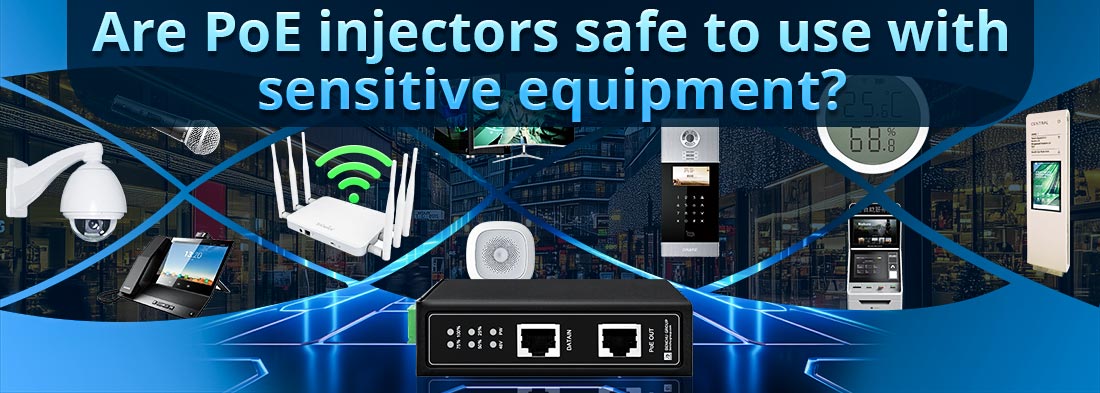
Yes, PoE (Power over Ethernet) injectors are generally safe to use with sensitive equipment, provided they comply with industry standards and are properly installed. However, several factors determine their safety, including compliance with IEEE standards, power negotiation protocols, and protection mechanisms.
1. How PoE Injectors Work
A PoE injector adds power to an Ethernet cable, enabling a device (such as an IP camera, access point, or VoIP phone) to receive both power and data over the same cable.
Active PoE Injectors:
--- Comply with IEEE standards (802.3af, 802.3at, 802.3bt)
--- Use a handshake process to deliver the correct voltage and power level
--- Safer for sensitive equipment
Passive PoE Injectors:
--- Do not use a negotiation process
--- Deliver a fixed voltage (e.g., 24V, 48V) without checking compatibility
--- Risk of damaging incompatible devices
For sensitive equipment, always use an active PoE injector that complies with IEEE standards.
2. IEEE Standards for Safety
PoE injectors following IEEE standards are designed with multiple protection mechanisms to ensure they do not damage connected equipment.
IEEE PoE Standards & Power Levels
| Standard | Max Power per Port | Device Compatibility |
| 802.3af (PoE) | 15.4W | IP phones, cameras, sensors |
| 802.3at (PoE+) | 30W | Wi-Fi access points, PTZ cameras |
| 802.3bt Type 3 (PoE++) | 60W | High-power APs, displays, industrial devices |
| 802.3bt Type 4 (PoE++) | 100W | Large displays, POS systems |
Devices and injectors using these standards include built-in negotiation (handshake) protocols to ensure the correct power level is supplied.
3. Built-in Protection Mechanisms
High-quality PoE injectors include multiple protection features to prevent damage to sensitive equipment:
Power Negotiation (Handshaking)
--- IEEE-compliant injectors detect the power requirements of the connected device before supplying voltage.
--- If a device does not support PoE, the injector will not send power, preventing accidental damage.
Overvoltage Protection (OVP)
--- Prevents excessive voltage from reaching the connected device.
--- Ensures voltage remains within the safe range (typically 48V DC for PoE).
Overcurrent Protection (OCP)
--- Stops excessive current flow that could damage sensitive electronics.
--- Protects against short circuits and power surges.
Short Circuit Protection (SCP)
--- Detects faults and immediately shuts off power to prevent electrical damage.
Thermal Protection
--- Monitors temperature and shuts down power if overheating is detected.
4. Best Practices for Using PoE Injectors with Sensitive Equipment
To maximize safety and protect sensitive devices, follow these guidelines:
--- Use IEEE-Compliant PoE Injectors
Always choose 802.3af, 802.3at, or 802.3bt certified injectors.
Avoid cheap or unbranded injectors that do not specify IEEE compliance.
--- Verify Device Compatibility
Check the voltage and power requirements of the connected device.
Ensure the PoE injector matches or exceeds the power needs without overloading.
--- Use Shielded Ethernet Cables
Shielded CAT5e, CAT6, or CAT6a cables help prevent electromagnetic interference (EMI), reducing risk for sensitive devices.
--- Monitor Temperature & Ventilation
Ensure the PoE injector is properly ventilated to avoid overheating.
Avoid placing it near heat sources or in enclosed spaces.
--- Test Before Deployment
Use a PoE tester to verify voltage and power output before connecting sensitive equipment.
5. Risks & When to Avoid PoE Injectors
PoE injectors are generally safe, but there are situations where caution is needed:
--- Avoid Passive PoE Injectors:
These do not negotiate power levels and can fry non-PoE devices.
Only use passive injectors if your equipment is specifically designed for them.
--- Do Not Use a Non-PoE Device with a PoE Injector
If a device does not support PoE, plugging it into a PoE injector without protection can damage it.
Use a PoE splitter to separate power and data if necessary.
--- Power Overloading Risks
Using an underpowered injector may cause system instability or power loss.
Using an overpowered injector (e.g., 100W PoE++ on a 15W device) is safe if it follows IEEE standards, but unsafe with passive PoE.
6. Conclusion: Are PoE Injectors Safe for Sensitive Equipment?
Yes, IEEE-compliant PoE injectors are safe for sensitive equipment because they regulate power using built-in safety mechanisms like power negotiation, overvoltage protection, and short circuit prevention.
However, avoid passive PoE injectors unless your device is specifically designed for them, and always check compatibility before connecting sensitive electronics. When in doubt, using a certified PoE injector from a reputable manufacturer ensures optimal safety and reliability.